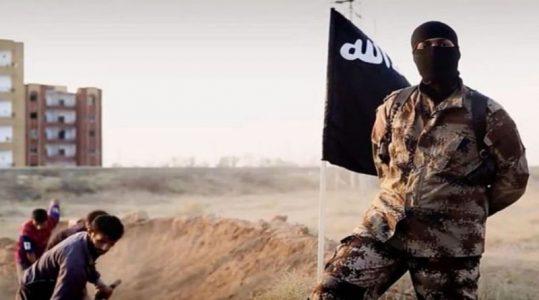
ISIS has secret reserves of £230 million for future terror attacks
ISIS militants have a secret war chest of up to $300 million (£230 million) which could be used to sustain its operations and fund new attacks on the West, according to a United Nations report released yesterday.
The terror group is assessed to have ‘bulk-stored’ some of the money in its stronghold area, while the rest has been smuggled abroad or invested in legitimate businesses.
Even if ISIS militants are forced out of their last holdout this week, the group has concealed the majority of its financial assets ‘with a strategic view to funding larger-scale attacks once the opportunity arises again,’ the report says.
A U.S-backed international coalition including the Kurdish-led Syrian Democratic Forces (SDF) has driven ISIS from its core areas of Mosul and Raqqa so that only a small enclave in the eastern city of Baghouz remains under its control.
Around 600 militants are left battling the coalition and U.S. President Donald Trump said they may declare victory over the terrorist organisation within days.
Tens of thousands of people, mostly women and children related to ISIS fighters, have fled the shrinking jihadist holdout to opposition territory, many of them claiming they were not supporters of the terror group.
But the U.N report also warns that foreign fighters and the extremists’ dependents will still pose a threat even after the ISIS is defeated.
‘Foreign terrorist fighters leaving the conflict zone, or prior returnees becoming active again on release from prison or for other reasons, will increase the threat,’ the report says.
‘The handling of dependants is particularly challenging. Radicalized women and traumatized minors may also pose a serious threat,’ it continues.
And the report notes that despite losing physical ground, ISIS still has up to 18,000 loyal members in its ranks in Syria and Iraq – including 3,000 foreign terrorist fighters.
Although direct propaganda from ISIS has been steadily decreasing, alarmingly ‘recycled material, online messaging and implausible claims of responsibility for attacks’ have increased in the last six months.
‘Military losses have forced ISIL to relinquish the idea of ruling a geographical “caliphate” for now, but the group retains that long-term aspiration and continues to proclaim it online,’ the report says.
The report also confirmed that the group is still led by Abu Bakr al-Baghdadi – who has not been seen in public since 2014, and has been pronounced dead on several occasions.
Source: Daily Mail





